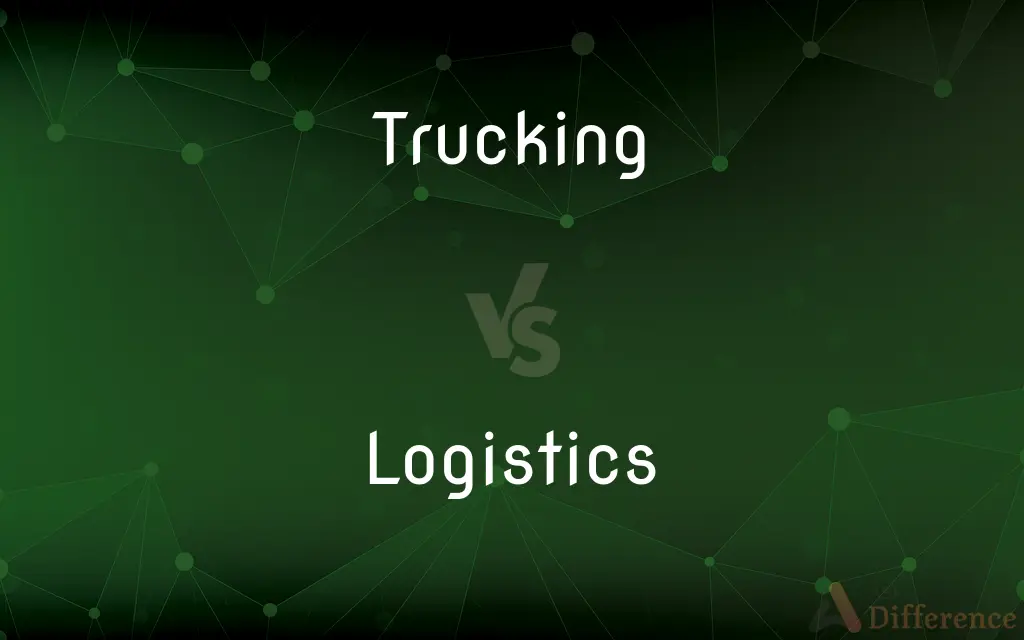Trucking vs. Logistics — What's the Difference?
By Tayyaba Rehman & Maham Liaqat — Published on March 4, 2024
Trucking involves the transportation of goods by road, focusing on vehicle operation and freight movement. Logistics manages the broader supply chain, encompassing transportation, warehousing, and distribution.

Difference Between Trucking and Logistics
Table of Contents
ADVERTISEMENT
Key Differences
Trucking is a critical component of the logistics industry, specializing in the movement of goods via large vehicles over short and long distances. It is primarily concerned with the operational aspects of freight transport, including vehicle maintenance, route planning, and load management. Logistics, in contrast, encompasses a wider range of activities aimed at efficiently managing the flow of goods from origin to consumer, including transportation, warehousing, inventory management, and order fulfillment.
Logistics uses trucking as one of its key transportation modes, integrating it with other methods like rail, air, and sea to optimize the supply chain. This integration allows for the strategic planning of goods movement, taking into consideration factors such as cost, speed, and environmental impact. Trucking, while focused on road transport, benefits from being part of a logistics strategy by gaining access to a broader network and streamlined operations.
The focus of trucking on the actual transportation means it deals directly with challenges such as traffic conditions, fuel consumption, and legal regulations. Logistics looks at these challenges from a strategic perspective, seeking to mitigate risks and improve efficiency across the entire supply chain. This includes selecting the most effective transportation methods and routes and managing the timing and storage of goods.
Trucking professionals may specialize in areas like driving, fleet management, or dispatching, logistics professionals have a broader focus that includes supply chain management, while logistics planning, and customer service. This difference highlights the operational versus strategic nature of each field, with trucking focusing on executing transportation and logistics on optimizing the entire supply chain process.
Technology plays a significant role in both trucking and logistics, but its application varies. In trucking, technology is used to improve vehicle efficiency, safety, and route planning. In logistics, technology encompasses a broader range of applications, from warehouse management systems to advanced analytics for supply chain optimization. This technological integration underscores the complexity of logistics compared to the more straightforward nature of trucking.
ADVERTISEMENT
Comparison Chart
Focus
Transportation of goods by road.
Management of the entire supply chain.
Key Activities
Vehicle operation, route planning, load management.
Transportation, warehousing, inventory management, order fulfillment.
Challenges
Traffic conditions, fuel consumption, legal regulations.
Strategic planning, risk mitigation, efficiency improvement.
Professional Specialization
Driving, fleet management, dispatching.
Supply chain management, logistics planning, customer service.
Technology Use
Vehicle efficiency, safety, route optimization.
Warehouse management, supply chain analytics, transport management systems.
Compare with Definitions
Trucking
The transportation of goods via large vehicles over roads.
Trucking companies often face challenges like fuel price fluctuations.
Logistics
The management of the flow of goods from origin to consumer.
Logistics strategies can significantly reduce operational costs.
Trucking
Involves short and long-distance freight movement.
Trucking is essential for last-mile delivery in urban areas.
Logistics
Integrates transportation, warehousing, and inventory management.
Efficient logistics is key to meeting customer delivery expectations.
Trucking
Focuses on vehicle operation and maintenance.
Effective trucking operations require advanced fleet management software.
Logistics
Focuses on optimizing the entire supply chain.
Technology plays a crucial role in logistics optimization.
Trucking
Subject to regulatory compliance and safety standards.
Trucking companies must adhere to strict environmental and safety regulations.
Logistics
Aims to improve customer satisfaction and reduce costs.
Logistics companies use analytics to forecast demand and optimize inventory.
Trucking
Critical for moving goods to and from ports and warehouses.
Trucking serves as the backbone of domestic freight movement.
Logistics
Involves strategic planning and risk management.
Global logistics requires careful planning to navigate international shipping regulations.
Trucking
Any of various heavy motor vehicles designed for carrying or pulling loads.
Logistics
The aspect of military operations that deals with the procurement, distribution, maintenance, and replacement of materiel and personnel.
Trucking
A wheeled platform, sometimes equipped with a motor, for conveying loads in a warehouse or freight yard.
Logistics
(operations) The process of planning, implementing, and controlling the efficient, effective flow and storage of goods, services and related information from their point of origin to point of consumption for the purpose of satisfying customer requirements.
Trucking
The trading of goods or services without the exchange of money; barter.
Logistics
(military) The procurement, supply, maintenance, and transportation of equipment, facilities, and personnel.
Trucking
Present participle of truck
Logistics
The planning and coordination of the movement of materials, and other details of any large activity, such as a business or a political campaign.
Trucking
The business of conveying goods on trucks.
Trucking
The activity of transporting goods by truck
Common Curiosities
What is trucking?
Trucking is the process of transporting goods by road using large vehicles like trucks.
Can logistics operate without trucking?
While logistics integrates multiple transportation modes, trucking is often essential for the final delivery of goods, making it a critical component of most logistics operations.
How do environmental concerns impact trucking and logistics?
Both fields are increasingly adopting green practices, such as using fuel-efficient vehicles in trucking and optimizing routes and supply chains in logistics to reduce carbon footprints.
What is logistics?
Logistics is the comprehensive management of the entire supply chain, from the flow of goods to warehousing and delivery.
What regulatory issues affect trucking and logistics?
Both sectors are affected by regulations related to safety, environmental standards, and international trade agreements.
How do trucking and logistics differ?
Trucking focuses on the road transportation aspect, while logistics involves broader supply chain management, including transportation, storage, and distribution.
How do trucking companies compete within the logistics industry?
Trucking companies compete by offering reliable, efficient, and cost-effective transportation solutions, often specializing in specific types of freight or regions.
What role does technology play in trucking and logistics?
In trucking, technology improves vehicle efficiency and route planning, whereas in logistics, it's used for broader applications like warehouse management and supply chain optimization.
How important is trucking in a logistics strategy?
Trucking is a vital part of logistics strategies, especially for last-mile delivery and transporting goods across distances not easily covered by other modes.
Is trucking more cost-effective than other forms of transportation?
Trucking offers flexibility and can be cost-effective for short to medium distances, but other modes like rail or ship might be more efficient for long distances or bulk goods.
What skills are important for professionals in trucking and logistics?
Trucking professionals need operational skills related to vehicle management, while logistics professionals require strategic planning and supply chain management skills.
What are the major challenges faced by trucking and logistics?
Challenges include managing costs, adhering to regulations, ensuring timely delivery, and adapting to technological changes.
How do global trends affect trucking and logistics?
Global trends like e-commerce growth and environmental regulations significantly impact both trucking and logistics, driving innovation and efficiency improvements.
What is the future outlook for trucking and logistics?
The future is likely to see increased integration of technology, greater emphasis on sustainability, and more sophisticated supply chain strategies.
How do logistics companies optimize their transportation networks?
Logistics companies use advanced analytics, route planning software, and strategic partnerships to optimize their transportation networks for efficiency and cost savings.
Share Your Discovery
Previous Comparison
Intrinsic Semiconductor vs. Extrinsic Semiconductor
Next Comparison
Table Tennis vs. Ping PongAuthor Spotlight
Written by
Tayyaba RehmanTayyaba Rehman is a distinguished writer, currently serving as a primary contributor to askdifference.com. As a researcher in semantics and etymology, Tayyaba's passion for the complexity of languages and their distinctions has found a perfect home on the platform. Tayyaba delves into the intricacies of language, distinguishing between commonly confused words and phrases, thereby providing clarity for readers worldwide.
Co-written by
Maham Liaqat










































